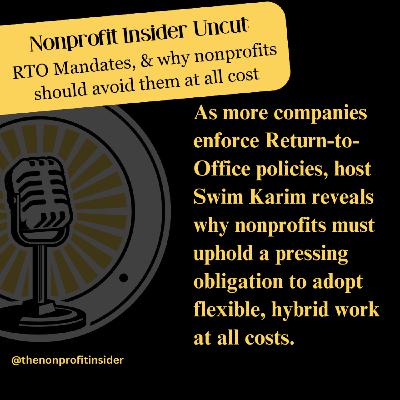Nonprofit Uncut Series: RTO mandates, & why nonprofits should avoid them at all cost
Description
Episode 56: RTO Mandates, & why nonprofits should avoid them at all cost
In this eye-opening episode, host Swim Karim dives into the rising wave of RTO (Return-to-Office) policies and explains why nonprofits have a critical responsibility to offer hybrid or remote work models. Drawing from industry data and firsthand nonprofit experiences, this discussion sheds light on the challenges and opportunities that come with flexible work—especially when mission-driven organizations aim to serve diverse communities and retain top talent.
Tune in to discover:
- The ethical and practical reasons nonprofits should prioritize flexible work.
- How RTO mandates can hinder diversity, equity, and inclusion efforts.
- Strategies for implementing a hybrid approach that supports both staff and mission impact.
Join us for a thought-provoking conversation that could shape the future of how nonprofits operate—and thrive—in today’s evolving work landscape.
If you're anything like me you like a nice evening tea in the evening after a long day. Visit Art of Tea for 10% off your next purchase of tea and tea accessories today, right here: https://artoftea.go2cloud.org/SHC
Follow The Nonprofit Insider Podcast:
YouTube-https://bit.ly/TheNonprofitInsiderPodcastYouTubeShorts
























